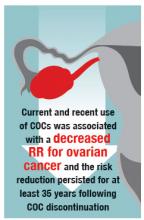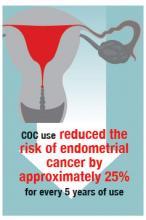There are no large randomized clinical trials exploring the relationship between COCs and the risk of developing cancer. Many epidemiological studies, however, have investigated the possible association between COC use and the risk of cancer. Such prospective and retrospective studies consistently report that the use of COCs significantly decreases the risk of ovarian and endometrial cancer. The epidemiological data are less consistent concerning the possible association between COC use and the risk of breast cancer. Meta-analyses conclude that current use of COCs may be associated with a small increase in breast cancer risk. In addition, prolonged use of COCs may be associated with an increased risk of cervical cancer.
Ovarian cancer
COC use is associated with reduced risk of ovarian cancer, and the risk reduction persists after discontinuing COC use. In an individual data meta-analysis of 45 epidemiological studies including 23,257 women with ovarian cancer and 87,303 women without it, COC use was associated with a relative risk (RR) of 0.73 for ovarian cancer. The magnitude of risk reduction increased with increasing duration of COC use. The RR and 99% confidence interval (CI) for ovarian cancer and mean duration of use was1:- 0.78 (0.73–0.83) for 2.4 years
- 0.64 (0.59–0.69) for 6.8 years
- 0.56 (0.50–0.62) for 11.6 years
- 0.42 (0.36–0.49) for 18.3 years.
In the Royal College of General Practitioners Oral Contraceptive (RCGPOC) study, about 23,000 womenwho did not use COCs and 23,000 current users of COCs were recruited around 1968 and followed for a median of 41 years. In this study, current and recent use of COCs was associated with a decreased RR for ovarian cancer (0.49) and the risk reduction persisted for at least 35 years following COC discontinuation (RR, 0.50; 99% CI, 0.29–0.84).2
In the prospective Nurses’ Health Study (NHS) I, 121,700 nurses were recruited in 1976 and followed for more than 30 years.3 For nurses who reported using COCs for more than 5 years, the rate ratio for ovarian cancer at 20 years or less and greater than 20 years since last use was 0.58 (95% CI, 0.61–0.87) and 0.92 (95% CI, 0.61–1.39), respectively. These studies show that the association between COC use and a decreased risk of ovarian cancer persists for many years after discontinuing COCs.
Endometrial cancer
COC use is associated with decreased risk of endometrial cancer, and the risk reduction persists for many years after discontinuing COC use. In an individual data meta-analysis of 36 studies that included 27,276 women with endometrial cancer and 115,743 women without it, COC use reduced the risk of endometrial cancer by approximately 25% for every 5 years of use. With 10 years of COC use the absolute risk of endometrial cancer before age 75 was 2.3 and 1.3 per 1,000 women for never and ever users of COC. Risk reduction varied slightly by histopathology, with risk reduction being greatest for type I endometrial cancer (RR, 0.68), slightly less for type II endometrial cancer (RR, 0.75), and lowest for endometrial sarcoma (RR, 0.83).4In the RCGPOC study of 46,000 women, the RR of endometrial cancer among current and recent users of COCs was 0.61, and the reduced risk (0.83) persisted for more than 35 years after discontinuing the COC.2
Related article:
2016 Update on cancer: Endometrial cancer
It is thought that the progestin in the COC provides most of the beneficial effect. Progestin-only contraceptives, such as depotmedroxyprogesterone acetate, progestin implants, and levonorgestrel-releasingintrauterine devices (LNG-IUDs) are also thought to reduce endometrial cancer risk. For instance, in a study of 93,842 Finnish women who used the LNG-IUD, the standardized incidence ratio for endometrial cancer was 0.50 among LNG-IUD users compared with the general population.5
Read about the effects of COC use in breast and cervical cancer.




